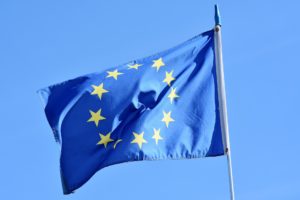Highlights from the Past Week
CW 7 / Monday, 14 to Thursday, 17 February: Plenary Sessions Week (Strasbourg);
DIGITAL SERVICES ACT I – SECOND TRILOGUE: Last week, the second political trilogue on the DSA took place. In citing a source from the Parliament, Euractiv reports that nothing was agreed upon, and that even the most contentious issues were moved back to the technical level. An updated 4-column document (PDF) was distributed ahead of the meeting.
Meanwhile, MEP Schaldemose tried to bring the Know Your Business Customer (KYBC) obligation for all hosting services back to the table. While she did not receive support from the shadow rapporteurs, the Council seemed willing to consider this.
MEP Schaldemose said this week that an agreement on the legislation could be reached by the end of June and acknowledged that finalising the deal before the French elections was no longer realistic.
DIGITAL SERVICES ACT II – COMMISSION CLARIFIES LIABILITY ISSUES: Contexte (Paywall, FR) has published a compromise proposal from the EU Commission on how, within the DSA, hosting services should deal with reports of illegal content from users (PDF).
In this context, it aims to clarify that service providers can only be held legally responsible after a report has been assessed, and not at the moment a user submits it. As stated in one comment: “This clarifies that the services shall not be held liable for making content available before they have completed this assessment, as they have not yet obtained actual knowledge.” The clarification is drawn from a European Court of Justice ruling on Youtube from a few months ago.
According to a comment cited by Politico Pro, communications should in principle not be anonymous, in order to prevent abuse. The institutions pointed out that service providers should not reveal the identity of a user who has complained about illegal content, unless it is a concrete case of copyright infringement or defamation. (see Politico Pro)
DIGITAL SERVICES ACT III – EXPERT OPINION ANALYSES DSA: The Friedrich Naumann Foundation has published an expert opinion (DE) by the Munich-based legal scholar Henrike Weiden, analysing the Commission’s proposal on the DSA.
While the assessment is generally positive, the report also includes a degree of criticism, particularly regarding the regulations on dealing with contentious content. For example, the enforcement of the law by the platform operators is deemed to be understandable, but would also entail “a further privatisation in the assessment of content”. In addition, the concept of “illegal content” depends on the respective national law and is “significantly broader than the definition of illegal content” under the Network Enforcement Act, which contains a predetermined catalogue of criminal offences.
According to the expert opinion, in the case of particularly large online platforms, the requirements of the Commission’s proposal together with sector-specific regulations would, due to the sheer volume, “probably de facto amount to a canon of tasks that is perilously close to a general obligation for automated content review”.
DIGITAL MARKETS ACT – ALL SIGNS POINT TO APRIL: As Euractiv reports, the MEP A. Schwab, rapporteur on the DMA, remains optimistic that negotiations with the Council can be concluded by the end of March or early April. Among other factors, differences over the role of the Commission still need to be resolved.
ARTIFICIAL INTELLIGENCE – MEMBER STATES DISSATISFIED: As comments from EU Member States (PDF) published by Politico Pro reveal, the states are dissatisfied with the way the AI Act’s rules are to be enforced.
Belgium, for example, believes that the Commission has given itself too much power and that the AI committee should be given the power to determine and change which AI systems should be considered risky. Denmark raises the question of why the board focuses solely on advising and assisting the Commission and wants the board to ensure the regulation is applied consistently. Sweden wants the board to have more autonomy and suggests that the AI committee should mirror the European Data Protection Board.
Denmark and the Netherlands also fear that, by having the AI committee adopt its rules of procedure by a simple majority of its members and after approval by the Commission, the Commission will have a disproportionate veto power.
The European Data Protection Supervisor said that the Commission’s proposal to accord itself such a prominent role in the AI board is at odds with the need for a European AI board that is independent of any political influence. The Data Protection Commissioner has called for the AI board to have more autonomy and “to be able to act on its own initiative”. The data supervisory authorities have proposed creating a central contact point for AI issues in the EU.
When it comes to the European Data Protection Supervisor, Italy proposes to have him invited to, but not to have him included per se, in the board.
Smaller EU countries also believe that the new complicated governance structure will prove difficult for them, given the fact that they do not have enough AI experts.
According to a non-paper (PDF), Slovakia advocates for a specialised and independent EU team to be responsible for AI enforcement, and that EU teams should have “strong institutional cooperation/communication links with relevant national and EU authorities”. Slovakia proposes governance structures that address AI through product safety and through AI systems and data flows. As the Slovakian paper states: “The enforcement of the [General Data Protection Regulation] has given all Member States lessons that a decentralised, nation level enforcement in cyberspace has its considerable limitations.”
The GDPR has been criticised for allowing tech companies to pick jurisdictions that will treat them preferably. This is a concern also expressed by Dragos Tudorache, the lead negotiator for the AI Act in the European Parliament’s Civil Liberties Committee. (see Politico)
FRANCE – ELECTRONIC PARENTAL CONTROLS FOR ONLINE PROTECTION: French deputies and senators agreed last week on a future law requiring the installation of parental controls by default on equipment placed on the market in France which is intended to be used online (e.g., tablets, PCs, smartphones, game consoles).
When such devices are used for the first time, it will be proposed that they be activated. Personal data of minors “collected or generated during activation” may not be used for commercial purposes. The installation obligation will not apply to equipment placed on the market without an operating system. However, it will apply to second-hand equipment with an operating system.
Meanwhile, it remains to be seen how the Commission will assess the impact on the European Single Market and how it will react. (see Euractiv)
GAIA-X FEDERATION SERVICES – IMPLEMENTATION PHASE BEGINS: The implementation phase of the Gaia-X Federation Services (GXFS) has fully started. The contracts have now been awarded as part of the German Federal Ministry of Economy and Climate Protection (BMWK) project, and in coordination with the Gaia-X AISBL. Meanwhile, the implementation partners T-Systems International, DAASI International, BigchainDB, Fraunhofer AISEC, ecsec and XLAB have started to implement the technical specifications defined last year.
The implementation phase is expected to be completed around the middle of the year. The GXFS should make a significant contribution to linking data and infrastructure ecosystems with each other, bringing to life the federated ecosystem envisioned by Gaia-X. (see eco press release)
GEOBLOCKING – EU PARLIAMENT CALLS FOR ACTION: MEPs last week adopted an own-initiative report from the Internal Market Committee (IMCO) (427 in favour, 218 against). In it, they call on the Commission, “as part of the evaluation report scheduled for 2022, to propose ways to remove unjustified and ineffective geo-blocking and to strive to build a harmonised digital single market”, in particular in the provision of audiovisual services and content (see para. 29).
UKRAINE IMPLEMENTS ART. 17 COPYRIGHT DIRECTIVE: While certain EU Member States have yet to transpose the DSM Directive, Ukraine has decided to implement certain provisions of the directive, reports the IPKat blog. This includes Article 17 of the DSM Directive on the uses of copyright-protected content by certain Internet platforms (the so-called “online content-sharing services providers”, OCSSPs).
The decision to transpose Art. 17 comes as part of a broader copyright reform, in the context of which five alternative bills on copyright are currently pending before the Ukrainian Parliament. These five bills all aim generally at complying with the EU/Ukraine Association Agreement, which requires Ukraine to implement certain provisions from the InfoSoc, the Rental and Lending, the Satellite and Cable, the Database and the Resale Right Directives (but not the more recent DSM Directive, as it was adopted after the Association Agreement was signed).
EUROPEAN CYBERSECURITY COMPETENCE CENTRE – NOMINATION OF CHAIR OF THE BOARD AND NATIONAL COORDINATION CENTRES: At its second official meeting, the Governing Board of the European Cybersecurity Competence Centre elected Pascal Steichen from Luxembourg as the Chair of the Board. Furthermore, the list of National Coordination Centres officially appointed by the Member States was ratified and published by the Board.
The Competence Centre, which will be located in Bucharest, together with the Network of National Coordination Centres, will contribute to strengthening European cybersecurity capacities as well as boosting research excellence and the competitiveness of the Union’s industry in this field. It will also manage part of the funding that is dedicated to cybersecurity from the Digital Europe and Horizon Europe programmes, as well as from the Member States. (see press release COM)
5G – TELECOMMUNICATIONS PROVIDERS CALL FOR COST SHARING: In an open letter to the Commission, Europe’s four largest telecom companies have called for major digital content providers to contribute to infrastructure investment.
The Chairs and/or CEOs of Telefónica, Vodafone, Deutsche Telekom and Orange claim that they had to massively upgrade their capacities during the pandemic and that “the investment burden must be shared in a more proportionate way”.
Relevant Publications, including from the EP Think Tank:
- The impact of influencers on advertising and consumer protection in the Single Market (Study)
- Plenary round-up – February 2022 (At a Glance)
- Fair and simpler taxation supporting the recovery strategy (Briefing)
- EU space policy: Boosting EU competitiveness and accelerating the twin ecological and digital transition (Briefing)
Outlook for the Current Week
You can find a list of the upcoming dates of the European Parliament here.The provisional meeting calendar for 2022 can be found here (PDF).
An overview of the most important dates of the Council week can be found here, the meeting calendar is accessible here, and the list of the main topics for the coming fortnight is available here, while an indicative calendar of meetings of the French Presidency Council can be found here (PDF).
Included among these dates are:
Summit and Ministry Meetings:
- Foreign Affairs Council, Monday, 21 February – Agenda, A Items;
- Agriculture and Fisheries Council, Monday, 21 February – Agenda, A Items;
- Informal Meeting of Transport Ministers, Monday, 21 and Tuesday, 22 February;
- General Affairs Council, Tuesday, 22 February – Agenda, A Items;
- Competitiveness Council (incl. Common Chargers, Chips Act), Thursday, 24 February – Agenda, A Items;
- Informal Meeting of Ministers for the Economy and Finance, Friday, 25 and Saturday, 26 February;
Preparatory Bodies:
- Working Party on Competition, Monday, 21 February and Wednesday, 23 February;
- Working Party on Cooperation in Criminal Matters (COPEN), Monday, 21 February and Wednesday, 23 February;
- Working Party on Intellectual Property, Monday, 21 February;
- Working Party on Intellectual Property (Copyright), Monday, 21 February;
- Working Party on Telecommunications and Information Society (incl. 5G, AI), Tuesday, 22 February;
- Horizontal Working Party on Cyber Issues (incl. NIS2), Tuesday, 22 February;
- Working Party on Tax Questions (Direct Taxation) (incl. Global Minimum Tax), Wednesday, 23 February;
- Cultural Affairs Committee, Thursday, 24 February;
- Working Party on Tax Questions (Indirect Taxation), Friday, 25 February;
- COREPER I (incl. NIS2), Wednesday, 23 February and Friday 25 February;
- COREPER II, Monday, 21 February, Wednesday, 23 February and Friday, 25 February;
Information about the weekly Commission meeting can be found in the preview (PDF) or (at short notice) in the current agenda. Topics of particular relevance include the legislative proposal against child abuse (now rescheduled for 30 March), and the Media Freedom Act (29 June).
The following topics are on the agenda for the coming week:
- Data Act (incl. Review of the Database Directive)
- Just and sustainable economy package
- Communication on decent work worldwide
- Sustainable corporate governance
You can find the judicial calendar of the ECJ here.
European Parliament Committees
CW 8 / Monday, 21 to Thursday, 24 February: Green Week (no meetings);
LIBE Committee (EP)
Current Meetings
- None
Further Meetings (Calendar)
- Wednesday, 16 March 2022, 9.00-12.00 and 13.45-15.45 (Brussels)
- Thursday, 17 March 2022, 9.00-12.00 and 13.45-15.45 (Brussels)
JURI Committee (EP)
Current Meetings
- None
Further Meetings
- Monday, 28 February 2022, 13.45-15.45 (Brussels)
- Monday, 14 March 2022 (Brussels)
Dossiers Timetable (9 February 2022)
ITRE Committee (EP)
Current Meetings
- None
Further Meetings (Calendar)
- Thursday, 3 March 2022, 9.00-12.00 (Brussels)
Dossiers Timetable (8 February 2022)
IMCO Committee (EP)
Current Meetings
- None
Further Meetings (Calendar)
- Monday, 28 February 2022, 13.45-16.15 and 16.45-18.45 (Brussels)
Dossiers Timetable (February 2022)
CULT Committee (EP)
Current Meetings
- None
Further Meetings (Calendar)
- Monday, 14 and Tuesday, 15 March 2022 (Brussels)
AIDA Committee (EP) – Special Committee on Artificial Intelligence in a Digital Age
Current Meetings
- None
Further Meetings (Calendar)
- Tuesday, 22 March 2022, 9.00-12.00 (Brussels)
INGE (EP) – Special Committee on Foreign Interference in all Democratic Processes in the European Union, including Disinformation
Current Meetings
- None
Further Meetings (Calendar)
- Open
Further Scheduled Parliamentary Calendar Dates
- CW 9 / Monday, 28 February to Thursday, 3 March: Policy Group and Committee Meetings Week (Brussels);
- CW 10 / Monday, 7 to Thursday, 10 March: Plenary Sessions Week (Strasbourg);
- CW 11 / Monday, 14 to Thursday, 17 March: Committee Meetings Week (Brussels);




